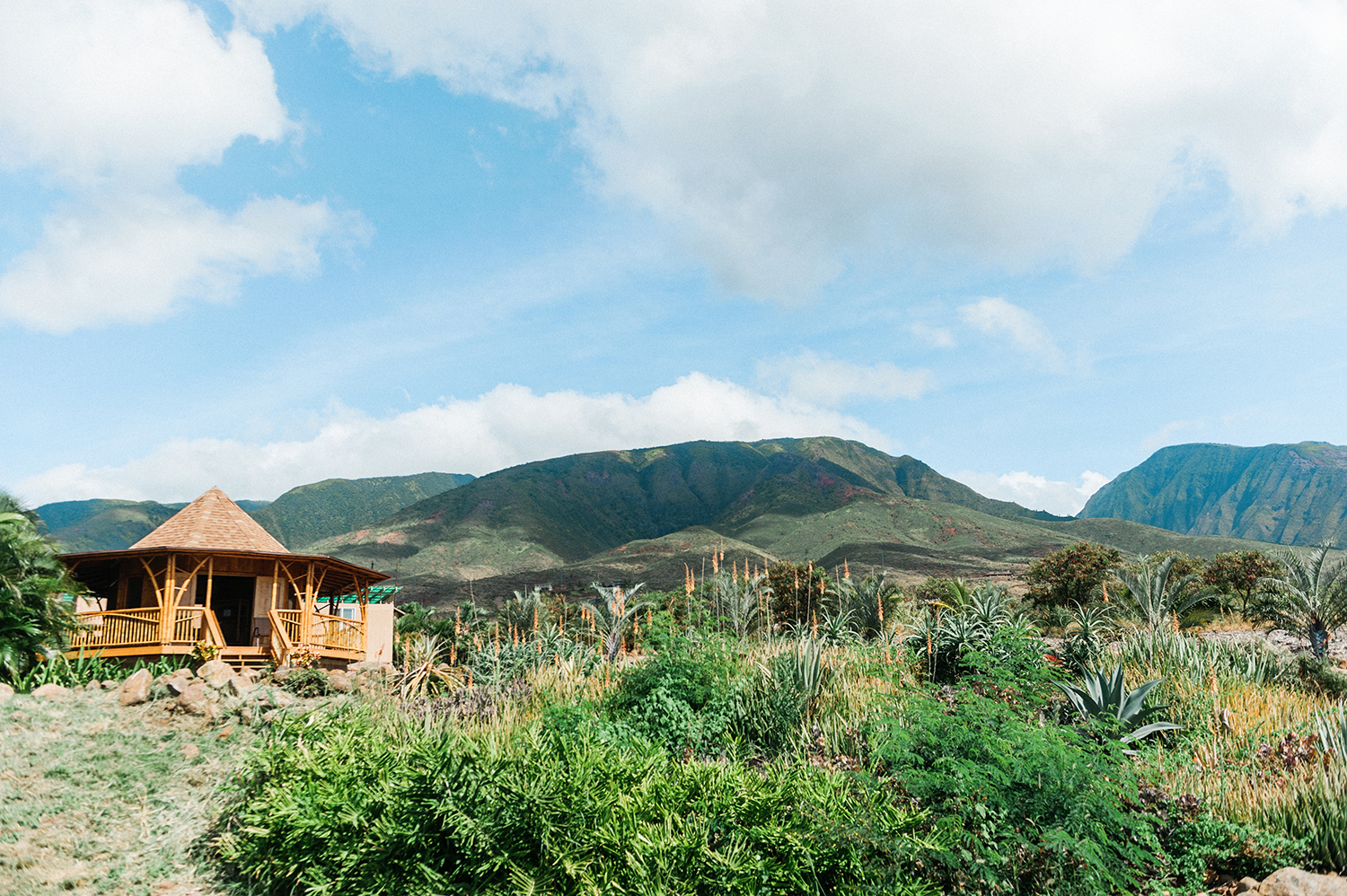If you love growing things and digging your hands into the earth, these stories of three farms growing unexpected crops on the Valley Isle will fulfill your daydreams.
Text by Sarah Ruppenthal
Images by John Hook
Maui may be known for its resorts and sun-drenched beaches, but the island is also home to a range of agricultural pursuits. Venture inland and you’ll find a patchwork of fields filled with the usual suspects: sugarcane, pineapple, and coffee beans. But Maui is also a hotbed for small, family-run operations that go against the grain. Meet three of these beyond-garden-variety farms, and the farmers behind them.
Maui Dragon Fruit Farm
Eight years ago, Crystal Schmitt was strolling through a street market in China’s Hainan Province when a flash of pink on a fruit cart caught her eye. She picked up the oddly shaped produce, marveling at its exquisite beauty. “I’d never seen anything like it before,” Crystal recalls. “It was breathtaking.”
“It” was a pitahaya, more commonly known as dragon fruit. Two years and much research later, the mechanical engineer quit her job to start Maui’s first dragon fruit farm. Crystal and her husband, Larry—whose family background in farming has proven priceless—imported 16 varieties and planted them on a 27-acre parcel of land in Lāhainā, while setting two rules for their growing and harvesting: the dragon fruit must be self-pollinating and it has to taste good.
Hardy by nature, a single dragon fruit plant can last up to 25 years under the right conditions. Crystal says Lāhainā’s sunny, arid climate is a perfect fit. “I never thought I’d be doing this,” she admits. “It seemed crazy at first, but I knew I had to make this happen.”
The USDA-certified organic farm also produces bananas, papaya, pineapples, avocados, sugarcane, and tropical flowers. Visitors to the farm can even tour the property and take on eco-friendly adventures including ziplining and aquaballing.
But at the end of the day, it’s all about the dragon fruit. “We believe it’s the future crop of Maui,” Crystal says. “Someday, we want Maui to be the dragon fruit capital of the country.”
For more information, call 808-264-6127 or visit mauidragonfruitfarm.com.
Malolo Farm
As a kid, Mark Minney helped out at his uncle’s protea farm, the first of its kind on Maui. “I wanted to have a flower farm since I was in high school,” Mark says. Years later, the general contractor planted a field of proteas on his own six-acre property in Kula, which he named Malolo Farm. Malolo is the Hawaiian word for “flying fish,” and is a sentimental name for Mark and his wife, Ali, who met while sailing around the world.
As the demand for their proteas grew, flower farming eventually became a full-time job for the Minneys. Today, they grow and harvest the protea blooms from bushes that reach up to 30 feet in height. “We do everything by sight and touch,” Mark explains. “It takes a lot of common sense and patience to get it right, and that comes from years of experience.”
Proteas are native to South Africa and Australia and are thought to be one of the oldest groups of flowering plants in the world—some scientists say they’ve been around for 300 million years. These dramatic flowers come in more than 1,400 varieties of shapes, sizes, textures, and colors (appropriately, the plant was named after the Greek sea god, Proteus, who could change his form at will).
Malolo Farm grows hundreds of varieties of proteas, including three crowd favorites: pincushions, silky-soft pink minks, and the ethereal king proteas. Several years ago, the Minneys, who are the only certified protea propagators in the state, partnered with the University of Hawai‘i’s hybridization program to create new varieties unique to Hawai‘i. Those flowers, which include varieties of leucospermum and pincushion, are now available at the farm.
For more information, or to order a floral package, call 808-878-6382 or visit proteasofmaui.com.
Maui Bees Farm
If Norman Rockwell were around today, he’d want to set up an easel at Mark and Leah Damon’s Kula farm. The picturesque four-acre property has all the trappings: a quaint farmhouse, roaming livestock, a sprawling garden, a nascent apple orchard, and a cluster of white boxes nestled in the shade. The final are manmade beehives, called “bee boxes,” each housing a colony of roughly 60,000 honeybees.
Mark, who has been interested in bees since he stumbled across the book The Joys of Beekeeping as a teenager, manages these colonies, along with 175 others throughout upcountry Maui. He is known as the “bee whisperer,” rarely wearing a veil or gloves when he pulls honeycombs from his bee boxes—instead he is protected by an antique handheld smoker that calms the bees with its emissions. According to Mark, a single colony can produce up to 150 pounds of honey each year; on average, bees collectively travel 24,000 miles and visit between three and nine million flowers to make a single pound.
Mark and Leah harvest their all-natural Maui Wildflower Honey in a building called the “honey house,” where the honeycomb is cold-processed (opposed to being heated) to separate honey from the beeswax—a technique that locks in natural flavor and color, as well as maintains live enzymes. Each year, the honey house churns out roughly 500 gallons of the thick, golden liquid.
Jars of Maui Wildflower Honey are available at local health food stores and farmers’ markets. Visitors to the farm can also purchase honey in quarts, half-pints, and pints onsite, where the Damons also offer beekeeping classes and have a small “You Pick” plot of vegetables to harvest from. “Bees are a good thing to have on your property,” Mark says. “Once you get to know them, you’ll see why.”
For more information, call 808-280-6652 or visit mauibees.com.
Bonus: There are more fun farms to visit on Maui. Check out Surfing Goat Dairy or Ali‘i Kula Lavender Farm, both of which are located on the slopes of Haleakala.










